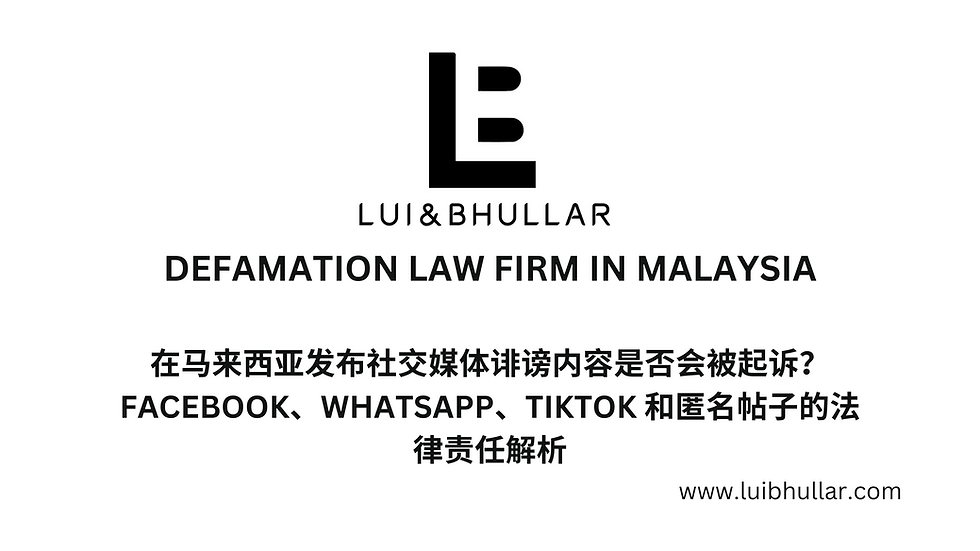Federal Court Clarifies Defamation Law in High-Profile Case
- Messrs Lui & Bhullar
- Jul 2, 2025
- 4 min read
Updated: Oct 15, 2025
by MESSRS LUI BHULLAR

Federal Court Clarifies Defamation Law in High-Profile Case Involving Malaysiakini
In a landmark high profile defamation case involving the popular news portal Malaysiakini, the Federal Court of Malaysia has delivered a significant judgment that draws a clear legal boundary between the defences of reportage and responsible journalism under the umbrella of qualified privilege. The ruling has far-reaching implications, especially for publishers, media outlets, content creators, and online defamation lawyers dealing with controversial matters of public interest.
Background of the Case
The respondent, a gold mining company, filed a suit for defamation and malicious falsehood against Malaysiakini and its personnel (the appellants), over three articles and two videos published online. These publications alleged that the company’s use of cyanide in Bukit Koman, Raub, had caused severe illnesses among villagers, environmental pollution, and the death of wildlife and vegetation. The company contended that the allegations were false, malicious, and had severely harmed its reputation, trade, and business.
The appellants, represented by one of the top defamation lawyers in Malaysia, defended the publications by asserting that the statements were not defamatory. Even if defamatory, they argued, the materials were protected under the doctrines of qualified privilege, fair comment, and responsible journalism, including a special category of defence known as reportage.
Initial Court Findings
The High Court Judge found that the materials were indeed defamatory but accepted the defences of qualified privilege under both responsible journalism and reportage, noting that the articles were published fairly, neutrally, and without malice. Consequently, the respondent's claim was dismissed.
However, the Court of Appeal reversed this decision, holding that the appellants failed to properly plead the defence of reportage and had, in fact, adopted the defamatory statements as their own. The Court awarded RM200,000 in general damages to the respondent.
Federal Court Questions and Rulings
The appellants sought leave from the Federal Court on nine pivotal legal questions concerning the nature and application of reportage, the pleading requirements, and the award of damages to a company undergoing voluntary liquidation.
In a majority decision by Abdul Rahman Sebli FCJ, the Federal Court dismissed the appeal and answered eight out of nine legal questions in favour of the respondent, affirming that:
Reportage and responsible journalism are separate and mutually exclusive defences. Reportage deals with the fact that an allegation was made, not whether it was true, whereas responsible journalism requires verification of truth and accuracy before publication.
Reportage must be expressly pleaded, and cannot simply be a “particular” under the Reynolds test of responsible journalism. The failure to do so deprived the appellants of relying on the defence.
The appellants had adopted the defamatory content and failed to remain neutral and disinterested, which disqualified them from invoking the reportage defence.
The tone and substance of the articles and videos were found to be accusatory, damaging, and lacking neutrality, thereby constituting an adoption of the defamatory allegations.
The respondent company was still entitled to recover general damages for loss of goodwill and reputation, despite being in voluntary winding up, as its legal standing at the time of filing the claim remained intact.
These determinations reaffirmed the importance of proper legal pleading and strict adherence to journalistic neutrality in media defence strategies against online defamation claims.
Minority Opinion and Divergence
Harmindar Singh Dhaliwal FCJ, in a minority dissent, argued that reportage is not a separate defence but part of the Reynolds framework of public interest privilege. He asserted that the pleadings sufficiently raised the elements of reportage and that the articles and videos were fair, balanced, and non-adoptive.
The minority further emphasized that media reporting on matters of public concern should be viewed with practical flexibility, particularly when dealing with urgent, developing stories such as environmental health concerns that had been in public discourse since 1996.
Impact and Significance
This Federal Court decision serves as a key legal reference point for online defamation lawyers, media publishers, and influencer defamation lawyers in Malaysia. It underscores:
The necessity of clearly pleading the correct defence—be it reportage or responsible journalism.
The importance of neutrality in reporting third-party allegations.
That companies in voluntary liquidation are not precluded from claiming reputational damages.
In an era where social media defamation and online content spread rapidly, this ruling provides critical guidance for journalists, influencers, and legal practitioners navigating the complex interplay between freedom of expression and protection of reputation.
Whether you are a media house, content creator, or public figure, it is crucial to consult with a defamation lawyer in Malaysia when publishing or responding to controversial matters online. For businesses or individuals affected by defamatory content, especially in the realm of social media defamation, engaging a top defamation lawyer is essential to protect your name and seek redress.
Need Legal Advice on Online Defamation?
If you are facing defamation online or wish to assess your risk before publishing sensitive content, consult with an experienced online defamation lawyer in Malaysia today. If you're unsure how to sue for defamation in Malaysia or need to identify the person behind defamatory online content, consult our legal team today. At Messrs Lui & Bhullar, we combine strong legal strategy with digital expertise to hold online defamers accountable.
📧 Email: general@luibhullar.com
📞 WhatsApp: +60143000970




Comments